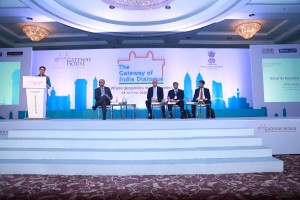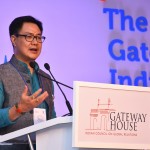The subject which we are going to discuss is so elaborate and it is very wide subject to think about and give your own opinion, and if I start speaking about the notes which I have of what the Ministry of Home Affairs has been doing, then it will become too academic and I don’t want to really make it into a reporting kind of a speech of what the Government of India and Home Affairs Ministry is doing.
But I would rather point out some of the issues, how we look at them and quickly understand how the Government of India is trying to face the challenges with regard to terrorism and cyber security. You must be realizing now that the incidents which the world is witnessing, especially in the last decade, I personally feel that more and more voices coming around in the world are sounding like Indian voices.
What we used to say a few decades back about the threat of terrorism and the kind of response we used to get for our counterparts, we were never satisfied because we felt that our concerns were never understood.
Sometimes we also say that to understand the real issue you must feel it, merely knowing the subject or knowing the incident is not enough, you must be able to feel it. And in clear terms I should say that you must be inflicted with pain to really understand the subject and to really understand the real threat terrorism poses.
Now wherever we go, we have understandings with various countries at multilateral level, bilateral level. Counter terrorism or the sharing of intelligence has become one of the very integral part of our understanding with friendly countries.
It has become so integral to how we look at the world and when we talk about terrorism, cyber security has become so much integral to understanding and to deal with terrorism. Now presently we are facing with these ISIS challenges, and many people put questions to the Home Ministry that how are you dealing with this threat, how much India is really facing the threat of ISIS, and India being a large Muslim populated country, how should we handle the situation? And when we sit and analyze in the Ministry and various with intelligence agencies I feel that there is nothing to worry about because Indian people have a strong character, which has developed because of our ethical behavior.
Just to make a point, when some of the youth have left India to join ISIS in Syria and Levant and those areas, it is the parents and it is the Muslim society at large they have been instrumental in persuading them back to the mainstream. That means that the Indian society has a strong feeling that violence has no space in our country. This is despite the numerous challenges we are facing because if you see the geopolitical location of India then India is in a very very critical location and our borders are very porous and it is not very easy. As a Minister looking after the border management, I always feel how to secure our borders, it’s very difficult, the fact is we cannot have any kind of a border, physical barrier, or fencing with Nepal, we do not have it with Bhutan, we can’t have it with Myanmar. The only 2 countries we are having this is with Bangladesh and Pakistan and that too, we know we have huge challenges and with China we cannot have a border.

So as a country as porous as our border is, it is difficult to really comprehend how we are managing but because of the character of the Indian society, we feel secured. We never, India abhors categorizing religion and terrorism together, we never do that. That is why when we are moving in terms of taking steps for counter radicalization, or for de-radicalization process, it is the senior citizens of the society they come and are the people who take much active role. And we have been very successful.
Now to understand cybersecurity, just to sound a little bit academic, according to the Information Technology Act, cyber security means protecting information, equipment, devices, computers, computer resources, communication devices, and information stored therein from unauthorized access, use, disclosure, disruption, modification, or destruction. So this is a very precise definition we have in our statute book.
But if you see the challenges, today as a Minister I can without any hesitation share with you that sometimes I become and I feel helpless because we do not have boundaries, crimes are committed, our youths are being influenced, our security areas are being breached, but because of the nature of the cybercrime you cannot do anything.
There are limitations and there are restrictions and I feel that our senior security officers they try to handle the situation as professionally as possible as they want to but we have limitations. That is why we are talking about collaboration; we are talking about working together. Every independent country on this planet must get together otherwise how do you control the cyber space. It is not merely the question of technology but it is much beyond.
And when I was thinking of speaking here, initially I thought I should make a very technical speech, I should come with a very prepared speech, but with 10 minutes in hand I thought rather I should just make very informal remarks and try to respond if we are to put forward with some questions, I should appropriately respond to your queries. But just to let you know a few of the important steps which is there in our mind and what we are doing in the Government of India. We definitely have a policy with regards to our cyber security. We have already developed our national cyber security policy which is already in place. And right now we are considering a framework for enhancing our cyber security of Indian cyber spaces. And we have developed a multi-layered response very in depth, so we have categorized in three different compartments.
- The first is the NTRO, which would be responsible for the protection of identified critical information infrastructure. It will be basically those infrastructures which is with the Government.
- And secondly will be with the Ministry of Defense. So in the Ministry of Defense, primarily DRDO and the defence service, our MO External affairs himself was a former army chief, so our army, our defense establishment, they have a very robust security system in place. They will be responsible for all defense related cyber threats vulnerability, detection, and mitigation process.
- And the third is, we have kept it with the department of information technology. They would be responsible for non-critical infrastructure and other critical information infrastructure which is not there with the NTRO. So that will be with the ministry and department of information technology. So we have developed this structure and the Home Ministry as a nodal ministry we would be coordinating, we would be making efforts for better coordination between all different spheres. And besides that we have, India has already developed our strategies, and this strategy will have so many agencies together and the Home Ministry again will be the nodal ministry, so that every ministry or every organization in the government, or to some with extent private entities also, we can have some kind of a seamless coordination. We can come together and make everything very robust so that we can respond to the call of the time.
And besides that, I would like to share with you this information about our data system. Now we are very much aware that this success story will depend on how much we share intelligence information with each organization. We have MAC at the national level, then we have MAC at the state level. So all our central intelligence agencies along with the state agencies, and we do have intelligence branches of various organisations also, we need to have a seamless body, so NATGRID formula came, which most of you must be aware. And we do get certain criticisms also, that we are not really taking forward NATGRID as it was envisaged in the beginning of when it was conceived.
I do admit that we should have progressed much faster. I also admit that we need to put in more resources. Because no matter how robust each system or each body is, unless we connect them with each other for a seamless sharing of information for proper coordination, we will never succeed, because the passing and sharing of information is so critical to secure all the systems in place, otherwise it will fail.
And we have learned a lot of lessons also. No need to mention about the incidents and those unfortunate occasions where we had to really look back at those fault lines.
Even the recent Pathankot incident, where there were huge discussions in the intellectual level also, that how despite having a proper intelligence inputs, in fact very precise intelligence inputs which were there, still the incident took place. So there are certain things that we do admit that we need to really get up and pull up our socks. But at the same time you all know, that it is such an area that every incident is different from the earlier one.
We really need to learn lessons from each incident. And as this conference is being organized by the Gateway of India Dialogue, initiated by the MEA, I feel that we have a very strong international presence here and it is a very appreciable job that the MEA have done and of course partnering with our Gateway House. And when I was told that this conference was going to have a very robust discussion, it may be a small gathering, but it will be a getting together of the brains, which will be very useful in understanding the subject. So I am sure that I should come and spend some time with you.
So as I said at the beginning, I do not intend to really make a very professional and very structured delivery of speech, so I thought I should just come and make a few remarks, then rather I should respond to the questions or the queries if you have any at the end of the discussion.
And Mumbai is really the gateway for many purposes, for many reasons, and to have this very important dialogue here in Mumbai is very meaningful also. And I am happy that I could come here and spend some time with you. And I would rather listen more, I put myself in a listening mode, rather than speaking out and talking much more than what I have just made a few of my remarks, and I once again thank the organizers for inviting me to speak here.
Kiren Rijiju is Minister of State for Home Affairs.
This speech was delivered as the Evening Keynote on Cybersecurity and Terrorism at The Gateway of India Dialogue 2016, held in Mumbai on the 13-14th of June 2016.
Watch the full Evening Dialogue on Cybersecurity and Terrorism here.
You can read exclusive content from Gateway House: Indian Council on Global Relations, here.
For interview requests with the author, or for permission to republish, please contact outreach@gatewayhouse.in.
© Copyright 2016 Gateway House: Indian Council on Global Relations. All rights reserved. Any unauthorized copying or reproduction is strictly prohibited


